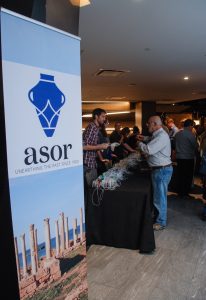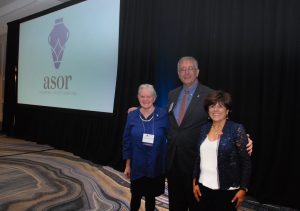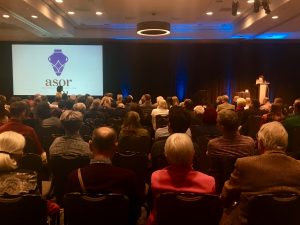
2018 ANNUAL MEETING SUMMARY
By Geoff Emberling, Helen Dixon, Arlene Press
The 2018 ASOR Annual Meeting was held November 14-17 at the Denver Marriott Tech Center in Denver, Colorado. Over the three days there were 100 sessions and workshops and more than 450 presentations given, as well as numerous meetings and social events.
ASOR’s Program Committee supervises the assembly of the academic program for the annual meeting. We have a framework of standing sessions chaired by ASOR members that covers the geographical, temporal, and disciplinary range of research supported by ASOR, and each year we also solicit proposals for more focused session proposals from ASOR members. The Program Committee also nominates a small slate of potential plenary speakers for consideration by the Chairs Coordinating Council each year.
The Program Committee (PC) in recent years has been interested in sustaining the traditional strength of ASOR in research on lands of the Bible but also expanding our scope to encompass research on neighboring cultures, earlier and later phases, and new theoretical and methodological approaches. The result has been a steady growth in the size of the annual meeting and an increasing feeling that the ASOR Annual Meeting is an exciting place to present and hear about research on the ancient and medieval Middle East and Eastern Mediterranean regions. We have also been mindful of the desire of many ASOR members to keep the conference to a manageable size, and have worked to find the right balance between those impulses.
We were very pleased to have our 2018 plenary address given by Hélène Sader of the American University of Beirut. The PC had been very interested in having a speaker from the Middle East as a plenary speaker, and Professor Sader’s presentation, “Between Looters, Private Collectors, and Warlords: Does Archaeology Stand a Chance?,” was a thought-provoking presentation of tensions surrounding excavation and site preservation in Lebanon. The presentation can be viewed online at ASOR’s website.
ASOR members who attended the meeting will all have their personal favorites among the sessions presented, but the most popular sessions based on reported attendance included a range of ASOR-sponsored sessions and member-organized sessions that demonstrated the traditional strengths of ASOR as well as some newer directions for research. And before listing those sessions, we hasten to add that the value of a session is not determined simply by the number of people in the room!
With that said, the best-attended session by far was, “The Megiddo Excavations: New Studies Reflecting on the Archaeology and History of Ancient Israel and Beyond,” followed by other sessions on archaeology of the Levant:
– “The Tenth Century B.C.E. Borderlands of the Greater Hesi Region: Implications”
-“The Huqoq Excavation Project”
-“Yerushalayim, Al Quds, Jerusalem”
A number of member-organized sessions drew large crowds and demonstrated the range of current interests of ASOR members:
-“Interrogating Cultural Change—Punctuated Equilibria Models in Near Eastern Archaeology and Egyptology”
-“What’s in a Name? Re-assessing the Oriental in the American Schools of Oriental Research”
-“Ambiguity in the Ancient Near East: In-Between Spaces and Otherworldly Encounters”
The session on “What’s in a Name?” was a workshop format with short presentations and more time for discussion and raised the question of whether ASOR needed to remove “Oriental” from its name. The consensus in the room was overwhelmingly in favor of making that change.
In addition, a number of ASOR-sponsored sessions drew particularly large audiences this year:
-Archaeology of Cyprus
-Approaches to Dress and the Body
-Bioarchaeology in the Near East
-History of Archaeology
It is also worth noting that ASOR has made particular efforts to keep our session on the Archaeology of Iran alive despite current political obstacles. The session this year included presentations by two Iranian Scholars who were able to attend the meeting only because of the support of the American Institute of Iranian Studies.
The Amman research center ACOR’s 50th Anniversary was recognized on the academic program with the session, ACOR at 50: A Retrospective and Prospective for the American Center of Oriental Research. ACOR and the Cyprus center CAARI held a joint celebration of their 50th and 40th anniversaries by sponsoring a reception for all attendees.
The Annual Meeting is a great place to present your research, learn about projects that might connect with yours in perhaps unexpected ways, to see old friends and make new connections. We look forward to working with you all in the coming year to create the program for the 2019 Annual Meeting in San Diego.


